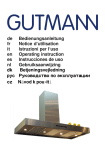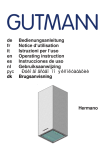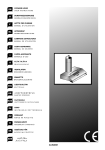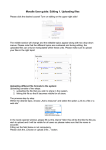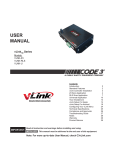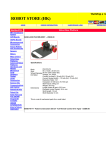Download CDA CIGE9SS cooker hood
Transcript
UK COOKER HOOD DEU DUNSTABZUGSHAUBE FRA HOTTE PER CUISINE NLD AFZUIGKAP ESP CAMPANA EXTRACTORA PRT COIFA ASPIRANTE ITA USER INSTRUCTIONS GEBRAUCHSANWEISUNG MANUEL DUTILISATION GEBRUIKSAANWIJZING MANUAL DE UTILIZACION CAPPA ASPIRANTE MANUALE DUSO SVE NOR VENTILATOR BRUKERVEILEDNING DNK BRUGERVEJLEDNING FIN GRC RUS OPORROFHTHRAS ODHGIES CRHSEWS âûòÿæêà ÈÍCÒÐÓÊÖÈÈ ÏO ÝÊÑÏËÓÀÒÀÖÈÈ POL CZE HUN ARE 3LI0IS0LA.1 ISOLA 290 540 : 820 D E B 285 D C 210 B 540 : 820 D I B A 285 G Fig.1 203 191 Fig.2 Fig.3 D3 ISOLA 290 540 : 820 D E B 245 D 210 B 540 : 820 D I B A 245 G Fig.1 203 191 Fig.2 Fig.3 ENGLISH ENGLISH GENERAL Carefully read the following important information regarding installation safety and maintenance. Keep this information booklet accessible for further consultations. The appliance has been designed as a exhausting version (external exhaust) or as a filter version (internal air recycle) cooker hood. SAFETY PRECAUTION 1. ake care when the cooker hood is operating simultaneously with an open fireplace or burner that depend on the air in the environment and are supplied by other than electrical energy, as the cooker hood removes the air from the environment which a burner or fireplace need for combustion. The negative pressure in the environment must not exceed 4 Pa (4 x 10 -5 bar). Provide adequate ventilation in the environment for a safe operation of the cooker hood. Follow the local laws applicable for external air evacuation. 2. WARNING!! In certain circumstances electrical appliances may be a danger hazard. A) Do not check the status of the filters while the cooker hood is operating B) Do not touch the light bulbs after appliance use C) Flambè cooking is prohibited underneath the cooker hood D) Avoid free flame, as it is damaging for the filters and a fire hazard E) Constantly check food frying to avoid that the overheated oil may become a fire hazard F) Disconnect the electrical plug prior to any maintenance. INSTALLATION INSTRUCTIONS • Electric Connection The appliance has been manufactured as a class II, therefore no earth cable is necessary. The connection to the mains is carried out as follows: BROWN = L line BLUE = N neutral If not provided, connect a plug for the electrical load indicated on the description label. Where a plug is provided, the cooker hood must be installed in order that the plug is easily accessible. An omnipolar switch with a minimum aperture of 3mm between contacts, in line with the electrical load and local standards, must be placed between the appliance and the network in the case of direct connection to the electrical network. • The appliance must be installed at a minimum height of 650 mm from an cooker stove. If a connection tube composed of two parts is used, the upper part must be placed outside the lower part. Do not connect the cooker hood exhaust to the same conductor used to circulate hot air or for evacuating fumes from other appliances generated by other than an electrical source. • EXHAUSTING VERSION In the case that an external evacuation pipeline tube exists, then connect a flexible tube to the connector (G) previously fastened to the hood; and then follow the instructions as described in the preceding paragraph (MOUNTING THE HOOD). • FILTERING VERSION Insert between the carrying structure and ceiling the air deviator (I) fig.3. Active carbon filters are necessary to depurate the air, that will be released in the room. Filters are not washable; they cannot be regenerated and have to be replaced at most every 4 months. The saturation of the activated charcoal depends on the more or less prolonged use of the hood, on the type of cooking and on the regularity of cleaning the grease filter. The filter has to be applied to the aspirating group, which is inside the hood hiting the centre of the group with it and turning it of 90 degrees until the stop click is heard to lock it. The air is released in the room through the holes made on the telescopic section (A) and on the upper connection (E) fig. 3. USE AND MAINTENANCE • It is recommended to operate the appliance prior to cooking. It is recommended to leave the appliance in operation for 15 minutes after cooking is terminated in order to completely eliminate cooking vapours and odours. The proper function of the cooker hood is conditioned by the regularity of the maintenance operations, in particular, the active carbon filter. • The anti-grease filters capture the grease particles suspended in the air, and are therefore subject to clogging according to the frequency of the use of the appliance. In order to prevent fire hazard, it is recommendable to clean the filter at a maximum of 2 months by carrying out the following instructions: - Remove the filters from the cooker hood and wash them in a solution of water and neutral liquid detergent, leaving to soak. - Rinse thoroughly with warm water and leave to dry. - The filters may also be washed in the dishwasher. The aluminium panels may alter in colour after several washes. This is not cause for customer complaint nor replacement of panels. • The active carbon filters purify the air that is replaced in the environment. The filters are not washable nor re-useable and must be replaced at maximum every four months. The saturation of the active carbon filter depends on the frequency of use of the appliance, by the type of cooking and the regularity of cleaning the anti-grease filters. • Clean the fan and other surfaces of the cooker hood regularly using a cloth moistened with denatured alcohol or non abrasive liquid detergent. THE MANUFACTURER DECLINES ALL RESPONSIBILITY FOR EVENTUAL DAMAGES CAUSED BY BREACHING THE ABOVE WARNINGS. • MOUNTING OF THE HOOD Fix the connection (G) fig. 3 to the hood with the 2 appropriate screws 3x13. Adjust and block the telescopic carrying structure (A) fig. 3 according to the desired height and fix it to the hood. Insert the two telescopic sections (B and D) fig. 3. Block the lower connection (B) to the the carrying structure (A) fig. 3 through 2 screws(ISOLA fig.1). Drill 4 holes to the ceiling and fix the hood through 4 screws and dowels, which are appropriate for that kind of ceiling and its material. Remove the the inner (upper) connection (D) and block it in the upper part of the carrying structure through the 2 screws (E) fig.3. 4





